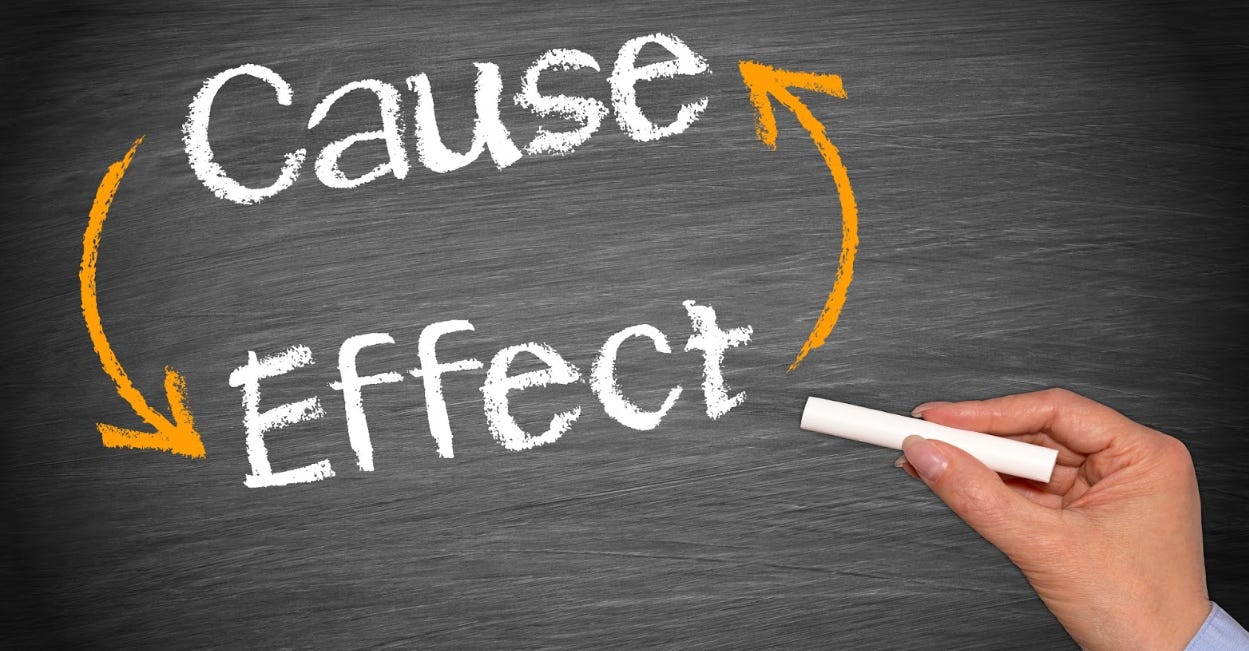What is sickness? The Merriam Webster Dictionary defines it as “an unhealthy condition of body or mind” Although a fairly basic definition, it includes conditions such as fatigue, fever, headache, cough, chills, and a runny nose. Unlike a disease, people look at illness as a condition to be suffered, a burden or inconvenience that’s expected. It's just the way things are, they reason.
Viewing illness through this lens is highly problematic. It may be common, but is it normal? Our body is meant to run in robust overall health, not in sickness or disease. So why do we get sick?
First, it does seem like there are more health hazards today than in the past, with the the nature of these hazards also constantly changing. Although we face fewer threats and mortality rates from infectious diseases due to advances in medicine and sanitation, our society is also increasing in chronic diseases.
Agricultural chemicals, household and medicinal poisons, unhealthy food ingredients, environmental toxins and so on continually and increasingly assault us today. Though at times this may not be a consumers fault, it still breaks laws of health that lead to diseases such as cancer, diabetes and heart disease at accelerating increase.
Concurrent with these new health hazards, people are increasingly and perhaps willfully breaking other basic laws of health! By that, I mean engaging in behaviors that are contrary to established practices for maintaining good health. The following list is a simple outline of both issues combined:
Lifestyle choices: High levels of stress, inadequate sleep, poor dietary habits, and sedentary behavior.
Environmental factors: Exposure to air pollution, contaminated water, household chemicals and toxic agricultural/food chemicals and pollutants.
Lack of sunshine and fresh air.
Consistently impacted gut health and weakened immune system
Modern technology such as cell phones and computers that lead to:
a) Postural deficiencies
b) Musculoskeletal issues: back and neck pain, repetitive strain injuries.
c) Eye strain and vision problems: excessive blue light leads to eye strain, dry eyes, blurred vision, and even nearsightedness.
e) Obesity and sedentary lifestyle: too much time on technology often contributes to obesity and associated health problems.
f) Radiation Exposure: exposure to radiofrequency radiation from cell phones and other devices has raised concerns about potential cancer risks.
g) Mental health concerns: anxiety and depression from constant connectivity and social media use.
i) Addiction and compulsive behavior: Excessive use of technology can lead to addiction-like behaviors.
j) Attention and cognitive issues: Frequent multitasking and constant notifications can impair attention span, memory, and cognitive function.
Emerging health threats: The rise of antibiotic resistance, vaccines and other toxic medications.
Sickness then is the body's reaction to a profusion of these poisons or toxins. As I stated, we are indeed exposed to toxins today in ways we may not be aware of, but a lack of foresight, knowledge and willpower does more to bring about illness and disease than anything else. We may not have control over all our circumstances, but that doesn’t mean that sickness or even not feeling well is normal. We are NOT powerless to control our health.
Cause and Effect
We’ve already discussed some of the factors that lead to illness and disease. Many of these can be avoided if our thinking does not run parallel to medical science—trying to deal with the effect—while ignoring the cause. Doctors and physicians attempt to remove the penalty for physical infractions, which does little more than encourage people to keep doing the same, with little accountability. When health issues escalate to a critical disease point, individuals may finally realize the detrimental effects of their choices.
Here is a definite fact: For every disease, there is a cause.
Comprehending this concept places you in the top 10 percent of societal health understanding.
Almost all sickness and disease results from an unhealthy diet. You need to make the connection because your body is simply food converted into either a state of well being or disease. Other factors come into play—of course—but food is your most important connection to good physical and mental health.
That means if you’re not consistently putting the right foods in your mouth, you will NOT have vigor and vitality. You’ll run at 50% of potential health capacity, while suffering progressive warning signs manifesting as persistent aches, recurring illnesses, and a general sense of malaise. If left unaddressed, these issues can escalate into chronic conditions such as heart disease, diabetes, or autoimmune disorders, severely impacting your quality of life and longevity. This is not a random occurrence, but rather the natural consequence of violating fundamental laws of health.
Disregarding the importance of proper nutrition sets in motion a chain reaction that compromises your body's ability to function optimally. Essential nutrients that fuel your cells, support your immune system, and promote overall well-being are depleted, leaving you vulnerable to a host of ailments.
It's crucial to recognize that this decline in health is not a matter of unavoidable fate. It's a direct result of neglecting your body's nutritional needs.
How Will You Stay Healthy?
Most in society implicitly trust the medical profession. But it hasn’t always been so. Gary Null wrote in Nutrition and the Mind: "If you go back 100 years we had no treatment except nutritional treatment. For 2,000 years the best doctors in the world always emphasized good nutrition, but over the past hundred years, nutrition suddenly disappeared from medicine."
Despite the importance of wholesome food in overall health and disease prevention, nutrition education in medical school is often limited. Studies have shown that medical students and doctors generally receive an average of 11 hours of nutrition training throughout their entire medical program.
This lack of emphasis on nutrition in medical education has several consequences:
Limited knowledge: Doctors may not have the knowledge or confidence to provide accurate and comprehensive nutrition advice to their patients.
Missed opportunities: Chronic diseases like obesity, diabetes, and heart disease are often linked to poor nutrition, and early intervention with dietary changes can significantly improve outcomes. However, due to lack of training, doctors may miss these opportunities.
Increased reliance on medicines: Doctors most often refer to medicines instead of focusing on whole-food dietary changes, which can be more effective and sustainable.
Although the medical profession says it promotes health, out of a decade of extensive training their education almost entirely ignores nutrition, while perpetuating a nutritional 'knowledge vacuum.
With doctors so ignorant about nutrition, no wonder the general public is ignorant as well. Most North Americans have poor eating habits, with few eating even the basic requirements of fruits and vegetables.
What Can You Do?
Many people stumble from one nutritional crisis to another, as if their shoes strings are tied and they don’t know it. It doesn’t have to be so. Proper nutrition does what no therapy or drug can achieve: it rebuilds the capacity of sick or diseased tissues because it deals with the cause—the problem at its source! In that sense you can indeed help yourself without the intervention of pharmaceutical products. You do not have to trust the pharmaceutical science!
The human body is a magnificent, biological system of complex processes that all work flawlessly together. It is fully capable of self-regulating and resetting. Ultimately, when we feel unwell we need to listen to our body and understand that it’s trying to tell us something. Whenever we experience symptoms such as headache, fatigue, fever, runny nose, pain, or cough, our body is letting us know that it’s been going through a series of disrupted biological processes. The longer we remain in this active phase, the longer the body will take to heal. When the conflict has been resolved, the body enters the healing phase, in which it restores its original, balanced state.
To move into a healthy phase, though, the solution must be consistent and definite. Eating properly can cause the body to go into a healing crisis after decades of improper foods. Also known as a Herxheimer reaction, this is a temporary worsening of symptoms that can occur when the body begins to detoxify and repair itself after the introduction of healthier foods.
Here's how it typically unfolds:
Detoxification: As the body begins to eliminate accumulated toxins with the elimination of offending substances and the introduction of mostly whole foods, and waste products, various symptoms can emerge. These may include:
Fatigue: The body requires energy to detoxify, leading to feelings of tiredness and exhaustion.
Headaches: Toxins released during detoxification can trigger headaches.
Skin breakouts: As the body eliminates toxins through the skin, acne or rashes may occur.
Digestive issues: Changes in gut bacteria and the elimination of toxins can cause gas, bloating, diarrhea, or constipation.
Flu-like symptoms: Some individuals may experience body aches, chills, or low-grade fever.
Healing and recovery: As the body continues to detoxify and repair, the symptoms gradually subside. This phase is often accompanied by increased energy, clearer skin, improved digestion, and a greater sense of overall well-being and continually improved health.
It's important to note that not everyone experiences a healing crisis, and the severity and duration of symptoms can vary depending on the individual's health status and the extent of dietary change.
Here are some tips for managing a healing crisis:
Stay hydrated: Drinking plenty of water helps flush out toxins and supports the body's detoxification processes.
Rest: Getting adequate sleep allows the body to focus on healing and repair.
Reduce stress: Stress can exacerbate symptoms, so finding ways to relax and de-stress is important.
Gentle exercise: Light exercise, such as walking, can help improve circulation and support detoxification.
Support your liver: The liver plays a crucial role in detoxification. Consuming liver-supporting foods like leafy greens, cruciferous vegetables, and berries can be beneficial.
What is the difference between a bodily healing (recovery) crisis and a disease crisis in the body? Both may look alike by their outward manifestations, but they are taking place under different conditions.
A disease crisis is when the body is loaded to its toleration point with toxins and waste. And these accumulate & inhibit the organs from performing their normal functions until finally a chronic disease manifests.
A healing crisis develops because the recovery forces are in the ascending order!
Even though it feels most unpleasant, you need to understand that this is not an active phase of the body fighting an alleged enemy, it is the body is healing!
During the healing (recovery) phase, an important role in the body is the elimination of toxins. If your effort is not consistent during this period, it will then have to re-enter the unhealthy phase once again, to deal with poisons. If you experience repeated events of the same type, then the healing phase remains incomplete.
Some people can be stuck in this cycle for many years (often referred to as chronic illness) without any solution in sight. However, once the initial conflict is recognized and resolved, even so-called chronic illnesses can often be resolved.
Will You Finally Regain Health?
In today’s nutritionally corrupted world, you need to have a fighting mentality or you will get sick. Don’t allow yourself to become weak with increasingly dangerous consequences. Become determined to go from docile to resolute and win this journey. Set your mind to finally conquer your weaknesses and stop eating food only because it tastes good. Start doing what’s right - eating foods that are actually healthy and maintain a strong body.
Whatever state people are in right now, with a few exceptions, they have likely earned it. But for the most part, a healthy state can again be regained with strategy and sustained implementation! Don’t let the window of opportunity pass—don’t accept an unmanageable condition—allowing your health to unravel unnecessarily. Failing to take the initiative comes with a high cost and catastrophic consequences.
Your mind possesses extraordinary potential. Harness your willpower to conquer your weaknesses, overcome ailments, and break free from the grip of pain. Distance yourself from the harmful substances that permeate our society. This includes the majority of processed foods found in supermarket aisles, packaged in boxes and cans, as well as the ubiquitous junk food readily available today. They poison your body, break your will; sap your strength and energy.
Do what’s right, look for the cause, eliminate it and finally regain your health.
Your presence here is greatly valued. If you've found the content interesting and useful, please consider supporting it through a paid subscription. While all our resources are freely available, your subscription plays a vital role. It helps in covering some of the operational costs and supports the continuation of this independent, unbiased research and journalism work. Please make full use of our free library.








